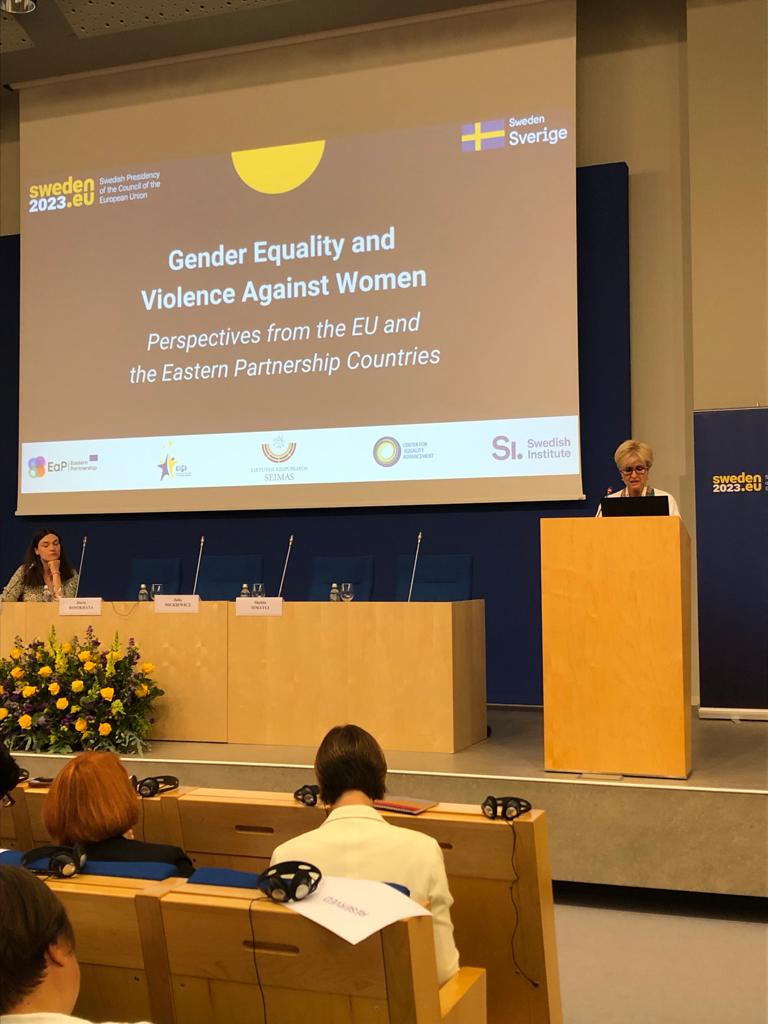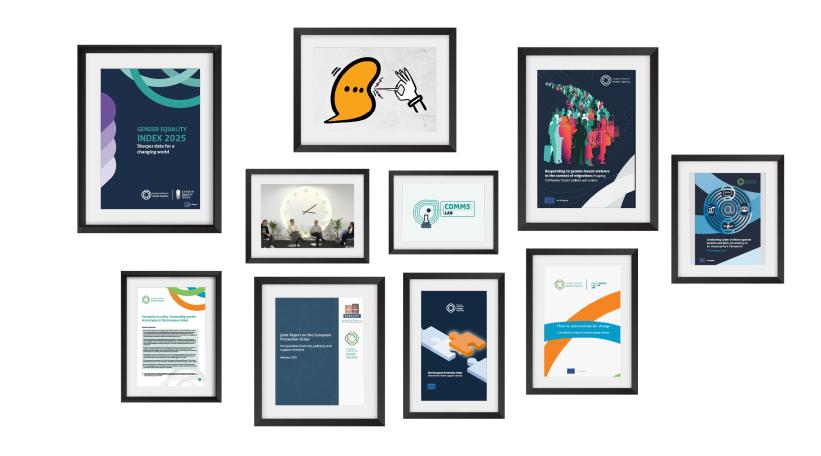 On 26 May 2023, EIGE’s Director provided the opening remarks at a conference held at the Lithuanian Parliament in Vilnius on Violence against Women in Times of Crisis: Challenges and Potential Solutions under the Swedish Presidency of the Council of the European Union.
On 26 May 2023, EIGE’s Director provided the opening remarks at a conference held at the Lithuanian Parliament in Vilnius on Violence against Women in Times of Crisis: Challenges and Potential Solutions under the Swedish Presidency of the Council of the European Union.
This event was jointly organised by the Swedish Embassy in Vilnius, the Lithuanian Parliament, The Lithuanian CSO Center for Equality Advancement and The European Institute for Gender Equality.
Dear honourable members of the Lithuanian Parliament, dear ambassadors, civil society representatives and colleagues.
It is a great pleasure to open this conference surrounded by critical actors playing an active role in combatting violence against women in times of crisis, conflict and beyond.
The past year has been particularly difficult as we are at a confluence of crises that are interlinked.
Between armed conflicts, natural disasters and climate change, and new threats, such as online hate speech and cyber violence there is one constant: women, children, youth, and elderly face higher risks of violence, exploitation, and economic hardships.
This was a key topic of concern and conversation in EIGE’s Gender Equality Forum last year – looking at where crisis and gender-based violence meet.
What it comes down to, is facing these challenges by developing solutions and action plans to prevent and tackle the gendered impact of crises.
To put this into focus - due to climate change one billion people are at risk of being displaced across the world by 2025. One billion.
Of those billion, there is a gendered impact. More women than men will face greater hardships.
Some of which are unspeakably cruel and unjust like domestic violence, difficulties accessing basic sanitation and economic vulnerability.
As I mentioned, climate change sits among other crises like the ongoing war in Ukraine.
In times of peace, approximately 35 percent of women worldwide experience gender-based violence (GBV) but in times of crises, this number swells to an alarming 70% according to OCHA.
These violations can occur for women fleeing conflict. Be that in the countries of origin, during their journey, in transit, or in the destination countries.
And gender is one part of it – violence intersects with social class, religion, ethnicity, race, sexual orientation, and gender identity. Imagine the experience a lesbian woman with a migrant background faces – the level of discrimination for simply being who she is. Where all she wants in the first instance, is safety and stability.
Now, in the context of Russia's military aggression against Ukraine a very fearful and uncertain layer is added for the most vulnerable to navigate.
EIGE’s recent study, as part of a project where we are collecting and mapping information on healthcare services that are available for women and girls shows that women and girls fleeing the war in Ukraine are confronted with barriers to accessing their sexual and reproductive rights in host countries.
Traditional gender roles, structural barriers, and prevailing stigma still hamper women and girls from accessing their human rights.
But international legal frameworks are the foundation to respond to and prevent gender-based violations in conflict and crisis.
The Temporary Protection Directive issued for people fleeing Ukraine is a promising example of how we can collaboratively respond to crisis situations.
On a wider EU level, the Commission’s legislative proposal on combatting violence against women and domestic violence will help to enshrine standards in EU law.
And beyond, the Council of Europe Convention on preventing and combating violence against Women and domestic violence – the Istanbul Convention – known as the ‘gold standard’ is a powerful framework on how to achieve gender equality through prevention, protection, prosecution, and integrated policies.
Let me unpack that a bit more…
Prevention - Gender inequality needs to be addressed at its roots. And that means overturning power imbalances which maintain these inequalities.
Protection - Women’s specialist services have done remarkable work in protecting victims of gender-based violence and advancing human rights. Partnership, recognition, financial support, and knowledge exchange should be central to our future cooperation.
Prosecution - Rape and sexual assault is a weapon of war. Perpetrators must be held accountable. Victims and their families must receive the reparations and compensation they deserve.
Integrated Policies – EIGE has been a steadfast support to Member States with its evidence. Our Gender Equality Index has been proven to help influence the design of effective and inclusive policies.
However, in addition to legal frameworks we need the political will to develop clear action plans and strategies.
We also must find innovative ways to disrupt power imbalances that prevail in our societies and challenge longstanding structural and institutional injustices.
We can do this by learning and leading from each other’s expertise and best practices in the areas of GBV.
And therefore, I am grateful to the Swedish Presidency for putting GBV so high on the agenda.
If in such a high-level political setting GBV is a central focus, then that reason alone is compelling enough to get everyone around the table to speak our cooperations into action.
We are stronger together.
Thank you.




